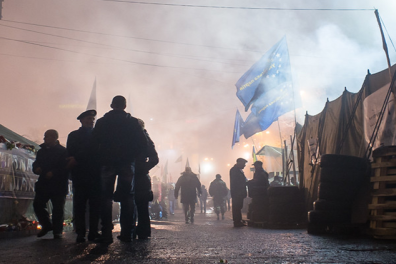Observatoire de l'Europe médiane contemporaine round table on "France's and the European Union's action towards Ukraine (2000-2022)", November 24

Matinées de l'Observatoire de l'Europe médiane contemporaine (Centre de Recherche Europes-Eurasie-CREE, Inalco).
Thursday, November 24, 2022 - 16:00 - 18:30 - Auditorium Dumézil
Inalco, Maison de la Recherche - 2, rue de Lille, Paris 7ème
Modalities: (hybrid face-to-face / distance learning)
- To attend this event face-to-face or distance learning, registration is required.
The action of France and the European Union towards Ukraine (2000-2022)
Round table moderated by Adrien Nonjon, PhD student at Inalco (CREE)
The large-scale war waged by Russia against Ukraine has led many states to reformulate, or even reorient, their foreign policies towards Russia and Ukraine. To understand the changes in French and EU policy towards Ukraine, and their impact on events, it is important to look back at how France and the EU have positioned themselves since the 2000s. Indeed, from the end of the USSR to the Orange Revolution, from Euromaidan to the annexation of Crimea, European issues and interstate relations are intimately intertwined.
What have been the positions of French governments towards Ukraine since the start of the Russian-Ukrainian conflict in 2014? Are we witnessing a change in French strategy today? How have the different approaches and methods of French politicians (including those of candidates in the 2022 presidential election) been interpreted by Ukrainian analysts and public opinion?
Furthermore, how has the European Union as a whole adapted its strategies to deal with political developments and challenges in Ukraine from the beginnings of the European Neighborhood Policy (ENP) in 2003 to the European Council's most recent decision (June 2022) to grant Ukraine candidate status? Finally, is the Common Security and Defense Policy (CSDP) also in the process of evolving and taking on more concrete forms in the context of this war on the EU's doorstep?
Speakers
- Laure Delcour, senior lecturer in political science at Sorbonne Nouvelle University and visiting professor at the College of Europe.
- Jacques Faure, diplomat, former French ambassador to Ukraine (2008- 2011), has held several important positions concerning Europe at the French Ministry of Foreign Affairs
- Oksana Mitrofanova, senior researcher at the Institute of World History of the National Academy of Sciences of Ukraine and teacher-researcher at Inalco (CREE)
- Philippe de Suremain, diplomat, former French ambassador to Ukraine (2002-2005), has devoted most of his career to Eastern Europe
The Observatory of Contemporary Middle Europe
The Observatory of Contemporary Middle Europe of the Centre de Recherches Europes-Eurasie (CREE), Inalco, aims to organize debates open to the general public, bringing together specialists (academics, experts, journalists, diplomats...) from the states and societies of Central Europe, to provide contextualized insights into current issues, and to question the perception of the region's civilian populations on political and social changes and phenomena that are the subject of debate. As well as addressing current issues, the Observatoire de l'Europe Médiane will also focus on longer-term societal questions (issues relating to internal politics, the socio-economic situation and transformations, cultural or media issues).
Created on the model of the Observatory of Post-Soviet States, which has existed since the 1990s, the Observatory of Contemporary Medieval Europe responds to the need to nurture knowledge, information and debate on a geographical area stretching from Finland to Greece, It includes the countries of Central and Balkan Europe, but may also, depending on the issues at hand, deal with its "margins", countries situated between two historical and political spaces, such as the Baltic States (both ex-Soviet and members of the EU), Ukraine or Belarus (ex-Soviet and Medieval Europe).
Organizers
The co-directors of the Observatoire de l'Europe médiane contemporaine:
Katerina Kesa (CREE, Inalco)
Anne Madelain (CREE, Inalco)
Jana Vargovčíková (CREE, Inalco)
Contacts: katerina.kesa@inalco.fr, anne.madelain@inalco.fr and jana.vargovcikova@inalco.fr